One of the best Qur’an reciters you’ve never heard, Imam Wisam Sharieff joins the Unscripted Podcast by Islam21c to speak about his remarkable journey that led to the Qur’an Revolution.
Find out what it is and how you can be part of it…
Watch
Listen or Download
[donationbanner]
Source: www.islam21c.com










Assalam aliekum
Brother Salman, this podcast is not appropriate and it never has been. What comes across from all involved in the podcast is a lack of respect regarding Allah’s Book. Look at the comments.
It should be took down, it is better for all involved, including you brother.
The deen is naseehah…..
Must admit I agree with bro Abu Musa, I stopped listening half way through as I found the humour OTT and it is subject which should be given upmost respect. I felt uncomfortable listening.
The joking really went overboard on this podcast and the Quranic message that I was tuning in for was diluted by it. The ‘blasphemy’ part was really unbefitting of any Muslim, let alone a Quran teacher. I really do think it was close to blasphemy if not blasphemy. Please clarify this matter for the viewers, is it permissible to speak about the Prophet SAW like that?
I think that the discussion at 56:15 regarding Muslim sisters ‘on stage’ reveals how much of a grey area it really is and how unsure we are about the whys and the hows of it all. We are certainly treading in murky waters and our respected brothers with knowledge are doing our sisters a huge disservice by not giving clear, well thought out guidance to them before they embark on a path in which they could be taking what is probably one of the first steps towards hypocrisy, and that is ‘putting themselves in fitnah (trial)’.
(The hypocrites) will call the believers: “Were we not with you?” The believers will reply: “Yes! But you led yourselves into temptations…” (Al-Hadid: 14).
Some sisters have already taken steps to speak on public platforms but the way that they conduct themselves reveals their own confusion. For example, their instinctive modesty in front of a male guest makes them smile and laugh less (if at all) but if that same guest as well as many other non-mahram men are at home and watching them online then it’s almost like they aren’t there and the need to control certain facial expressions and smiles goes away. Not having this guidance already in place means that we will end up being in a position of closing the stable door after the horse has bolted.
Also, we shouldn’t allow the disbelievers to pressure us into reacting to their labels, such as ‘misogynistic’, by throwing our sisters to the wolves. Like Imam Wisam Sharieff said, “Is it fair for us to Islamicise everything? We are basically trying to fit their culture into our world…”
Furthermore, regarding the issue of females learning Qur’an from behind a curtain/screen of some sort, although there may not be many non-Arab, Salafi, female Qur’an reciters with ijaazah here in the UK, our Tablighi brothers and sisters seem to be way ahead and using screens is integral to their way of getting females to get ijaazah from males. I’ve seen their system in action and a young sister I know gained ijaazah for recitation from the Pakistani teacher of a well-known Saudi muqri, just a few years ago. Even though he was in his 70s, she either learnt from behind a screen or via Skype when he would return to Madinah (even though she wears a niqaab).
The guidance of scholars regarding males teaching females has always been that the man should be elderly and that he should teach from behind a screen. Removing the screen will only serve to add an element of fitnah that nobody needs. There’s been a concerted effort by our respected imams and ustaadhs to address marriage problems especially the issue of ‘the lack of an emotional connection’ with one’s spouse. Putting male and females together in such a close space is foolish, especially with learning Qur’an. I mean, it’s one area in which Shaytaan can give you a valid excuse to even look at her lips! After all, you need to check if she’s pronouncing her ‘thaas’ properly don’t’ you?
We already have Islamic institutions in which men and women do liaise and some of us have witnessed the fitnah that it causes. Again, we shouldn’t allow the disbelievers to shame us into copying them with ‘can’t Muslim men be trusted to work with women?’ Their own adultery statistics due to affairs in the workplace are abysmal. I heard a married sister once tell me that she hated answering the phone to a particular married brother as it ‘gave her butterflies’. She was a good sister and she hated how it made her feel. If we continue to remove the barriers of protection that our deen has given us, especially the screen between a female and a male Qur’an teacher, then don’t be surprised if your spouse comes home and tells you that they don’t feel from you the emotional connection and butterflies that they get in the company of their teacher/student.
Finally, it’s also wrong to assume that sisters want the physical barriers to be removed when they are learning from a male teacher. That’s simply not true.